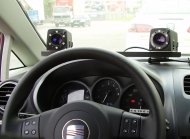12/7/2008
Europe Develops RFID License Plate TrackingEuropean Union spends $10 million to develop advanced system to track motorists and issue tickets for minor infractions.

The European Union is spending 8.1 million Euros (US $10.3 million) on wireless tracking systems designed to allow authorities to issue automated tickets for increasingly minor traffic infractions. Pilot projects underway in Finland, France and Germany use systems designed by the VTT Technical Research Center of Finland as part of a project called ASSET-Road. Radio Frequency Identification (RFID) is a key component in achieving the goal described as "traffic violations detected in a flash." Many of the ideas have already made their way to the United States.
"The intention is to elaborate for public authorities new innovative solutions and technology to gather traffic data and utilize it in traffic enforcement and surveillance," VTT explained in a statement.
Prototype units of the Finnish technology issue automated tickets commercial vehicles for violations, no matter how small, of height or weight restrictions. Last month, Arizona-based camera vendor American Traffic Solutions (ATS) announced it would begin selling a similar system to jurisdictions interested in ticketing truckers. The European system adds the capability of issuing automated tickets for vehicles that appear to have faulty brakes.
Another system under development targets passenger vehicles by constantly tracking the distance between automobiles. Any car within sensor range that strays too close to another vehicle would be mailed a ticket for tailgating. In documents provided to the Arizona Department of Public Safety, ATS also explained it has developed automated tailgating tickets as a feature that can soon be added to existing speed camera programs.
Camera-based systems, however, are prone to error when the machinery fails to read a license plate accurately. European officials hope to increase the ease and accuracy of total vehicle surveillance by switching to RFID.
"VTT is also investigating the utilization of RFID technology as an electronic number plate where the tags imitate electronic license plates," the company stated. "When these tags are mounted on a vehicle, an RFID reader can then identify each vehicle according its identity code."
Readers for RFID systems, like the ones used to monitor E-ZPass, FasTrak, SunPass and TxTag toll road transponders, can also be more easily hidden than a camera. In 2005, a Texas lawmaker proposed a bill that would have forced all state residents to use RFID chips in their license plates (read bill). The bill failed to gain support, but the universal surveillance program envisioned by such programs is slowly advancing. The cities of Hanover Park, Oak Forest and Streamwood, Illinois last month announced they would deploy red light cameras with an "amber alert" feature provided by the Dutch company, Gatso. This feature allows every passing vehicle to be photographed, identified and tracked. Complete travel histories for all motorists could be stored in a database so that allows police and other officials could keep track of any individuals of interest.
In Edmonton, Canada, for example, the police used information stored in a less sophisticated database in 2004 to track journalist Kerry Diotte after he had written a column critical of the city's photo radar program.


